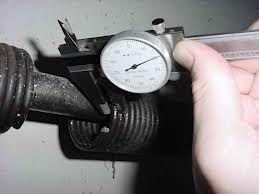There is a reason why garage door springs are tensed. To lift the door. By nature (so to say), springs have a lot of power since they are made in the form of spiral coils. When they are installed, they are wound really tightly and adjusted so that they will use their hidden energy to balance and open the door. The way they are manufactured says a lot about them and their usefulness.
- Springs won’t last forever
- Without springs, the overhead garage door will not go up
Why don’t springs last forever?
- Springs are made to last for a number of cycles – each cycle corresponds
to each opening/closing of the door. Most springs are manufactured to last for 10,000 cycles – some are made to last for less and some can last for 20,000 cycles. So when their life expectancy is over, they will break.
- And then there is the daily pressure from the garage door’s weight. Although they work in a different way, both types of springs (torsion & extension) get exhausted by the daily stretching and contracting of their coils. This movement weakens their power and coils eventually lose their flexibility to the point that they cannot move the door anymore.
- Since most springs are made of steel, they corrode. Rust builds-up and will cause their premature breaking. If the environment is highly humid, they will rust even faster. When steel corrodes, it is actually damaged and can break, especially when it is under pressure. So at this point, you are most likely wondering why not installing galvanized garage door torsion springs? Well, although these springs won’t rust, they need constant adjustments. And this indicates that such springs are not as durable as oil-tempered ones.
What you CANNOT do
What we have established so far is that torsion and extension springs for garage doors will wear and thus break. Although there is nothing you can do when their lifespan is completed, you can make sure they don’t break prematurely. It’s one thing to schedule garage door spring replacement and another thing dealing with broken springs. In the case of the latter, you will not be able to open the door. If the spring snaps with the overhead door in the opening position, it will come down with force. If you are standing in its way when it breaks, you will get seriously hurt.
What you CAN do
One thing you can do is take care of the springs. But not alone. Any spring repair service will force you to come face to face with this component. In the event of sudden breakage due to bad handling on your part, you will be injured. What needs to be done is lubrication. Lubricants help coils remain flexible since they prevent them from getting corroded. And that’s basically all you can do to keep them from breaking prematurely.
Let us just throw one final advice: choose the right spring right from the start. If you don’t have the right spring, it will break faster because it won’t have the power to carry the door’s load. If you have one garage door torsion spring, install one more. Two springs share the load and if one breaks, the door will still move.

 to each opening/closing of the door. Most springs are manufactured to last for 10,000 cycles – some are made to last for less and some can last for 20,000 cycles. So when their life expectancy is over, they will break.
to each opening/closing of the door. Most springs are manufactured to last for 10,000 cycles – some are made to last for less and some can last for 20,000 cycles. So when their life expectancy is over, they will break.





